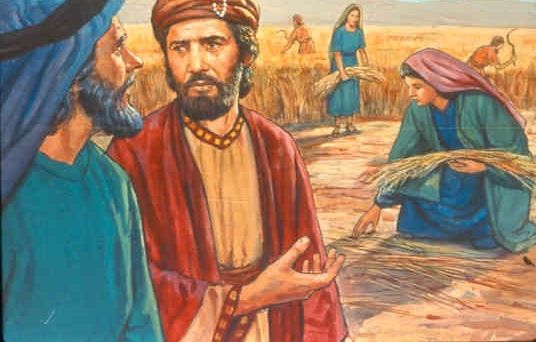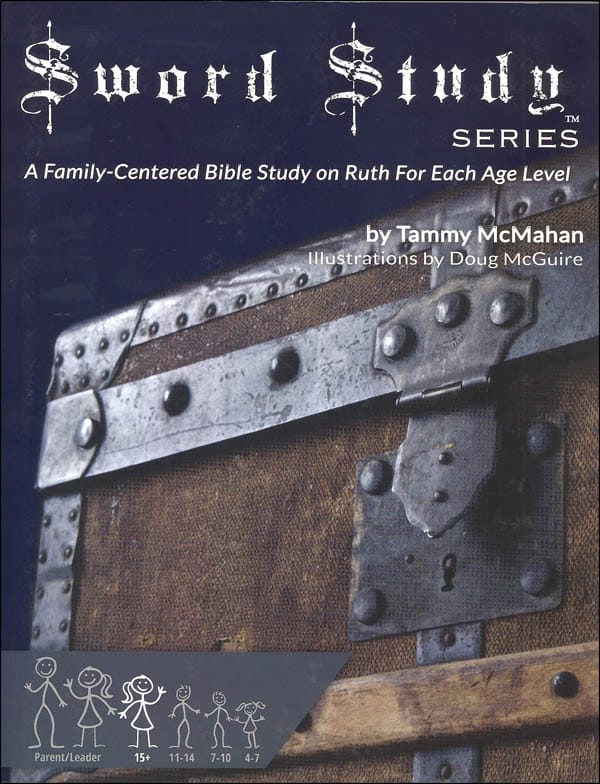A Worthy Man1/25/2017 “Now Naomi had a relative of her husband’s, a worthy man of the clan of Elimelech, whose name was Boaz.” ~Ruth 2:1 Chapter two opens up with an introduction of our third main character: Boaz. Throughout this chapter, we glimpse various aspects of Boaz’s character which are unexpected for a man living in the days of the judges—an era in which “everyone did what was right in his own eyes.” (Judges 21:25b) Amidst this cultural background and spiritual climate lived the hero of our story, Boaz, and it is his life and character we are going to study today. One of the first things we learn about Boaz was that he belonged to the clan of Elimelech and was related to Naomi through her marriage to Elimelech. Scripture also tells us that Boaz was a worthy man, or as some translations read, a mighty man of wealth. Now at first glance we would gather from that statement that Boaz was very wealthy. However, by taking a closer look at the meaning of the Hebrew word translated as wealth, we discover it really means that Boaz was mighty in valor or virtue. This gives us a completely different picture of what Boaz was like, doesn’t it?! So instead of visualizing a pompous, wealthy man enjoying the leisure of his monetary success, view Boaz as a man strong in virtue and not lacking in valor. The next thing we notice about Boaz is that he was extremely kind with his employees and had a good report with them. And not only did he have a good relationship with all those in his employment, but he also greeted them with a blessing in the name of the LORD! How often do employers do that? Now I realize that we could argue that this was the custom during those days, but I still believe that Boaz possessed a solid, personal belief in the God of Israel which guided and directed his interactions with his employees. Finally, one of the most outstanding character qualities of Boaz was his care and concern for the needy. God commanded the Israelites to allow the foreigners, fatherless, and widows to glean the leftover and missed portions of the harvest. Sadly, many Israelites did not follow this rule, as evidenced by the rebukes of prophets such as Isaiah and Jeremiah. However, Boaz did obey the command, and had done so long before Ruth came along. For when Ruth arrived at the field, she didn’t ask Boaz if she could glean after the reapers, but she asked the servant in charge for permission. And what did that man say? Yes, and he didn’t have to consult Boaz for the answer because he would have already known Boaz’s policy and precedent for situations like these. So why in an era where each man looked out for himself, and during a bountiful harvest following a famine, was Boaz concerned for and providing for the destitute? And why did he specifically show special kindness to a foreigner like Ruth? Was it because she was attractive? While I’m sure Ruth was pretty to look at, the answer to these questions may be found in the history of Boaz’s family. If you look back on the genealogy of Boaz, you’ll find that his mother was none other than the former prostitute from Jericho named Rahab. Rahab’s story is one of redemption, mercy, and grace. However, even after she joined the people of Israel following the destruction of Jericho, she would have still been a foreigner—one not of Jewish descent. So don’t you think that she would have impressed upon her son compassion for the foreigner? I think so. So when Boaz saw Ruth gleaning in his field, was he attracted to her beauty or did he see his mother in her bent over figure and remember the lessons she taught him about kindness and mercy to those in need? What really prompted Boaz to show extra kindness to the young Moabite named Ruth? We will never know the answer to these questions, but we can speculate and learn from the character of Boaz. Like the days of the judges, our world is getting close to that point where everyone does what is right in his own eyes. However, in the midst of this depravity, are we living our lives like Boaz did? Would those around us be able to say that we are strong in virtue, a worthy man or woman? Would those working with you say that you were an especially kind and wonderful employer or co-worker? How do non-believers rate our treatment of them? Would they say that we showed kindness and exhibited the love of God? Or would they give a different report? When we see the needs of the lost, widowed, fatherless or foreigner are we moved with compassion? Are we willing to give from our bounty to help those dependent on the generosity of others? May we become men and women with the character of Boaz! And as we seek to help those in need and share the grace and mercy of God with those around us, may we remember this promise from our Lord and Savior Jesus Christ: “‘For I was hungry and you gave me food, I was thirsty and you gave me drink, I was a stranger and you welcomed me, I was naked and you clothed me, I was sick and you visited me, I was in prison and you came to me.’ Then the righteous will answer him, saying, ‘Lord, when did we see you hungry and feed you, or thirsty and give you drink? And when did we see you a stranger and welcome you, or naked and clothe you? And when did we see you sick or in prison and visit you?’ And the King will answer them, ‘Truly, I say to you, as you did it to one of the least of these my brothers, you did it to me.’”
~Matthew 25:35-40
Comments
|
Ruth Sword StudyReceive Posts by EmailCategories
All
Archives
March 2017
|


 RSS Feed
RSS Feed